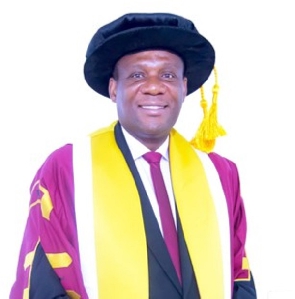Fellow Ghanaians in Academia, the C. K. Tedam University of Technology and Applied Sciences (CKT-UTAS) is only 2 years and 5 months old (Inaugurated on 6th May 2020). An Inaugural Lecture is an occasion in Academia to recognise the promotion of an Associate Professor to the rank of a Full Professor/Professor where the Full Professor/Professor delivers a public lecture showcasing their research with a broad audience such as the University community, colleagues, members of the public, friends, and family members on some monumental achievements chalked. In addition, other things to look out for in an Inaugural lecture are as follows: 1. Where they started from, 2. How they started, 3. Challenges they faced or cost they incurred, 4. How they managed these challenges, 5. Where they are going, 6. Their beliefs and the pieces of advice. A 2nd Inaugural Lecture series within 2 years and 5 months on 20th October 2022 points to the fact that CKT-UTAS has promoted only 2 Persons/Associate Professors to the rank of Full Professor/Professor, the highest level in Academia. Thus, the 2nd Inaugural Lecture is a special occasion in recognition promotion of the 2nd Person (An Associate Professor) to the esteemed position of the highest rank in Academia (Full Professor/Professor)! This personality is Bishop Professor Albert Luguterah. The Bishop and affable Professor made a touching in-person presentation to many young academics, Traditional Leaders, members of the public, members of noble Associations, the CKT-UTAS community, and many others in Ghana, Asia, Europe, and the United Kingdom filled the 500-seats spaciously arranged at the ground floor of the 2500 seater Auditorium in CKT-UTAS. The production of the 2nd Inaugural Lecture Series of CKT-UTAS on "The Statistics, the Noise, and the Cacophony- Applying Statistics in a contemporary World" is in 2 hours 6 minutes and 8 seconds ceremony captured live on Facebook. Bishop Professor Albert Luguterah has a BSc (Hons) in Statistics with Mathematics from the University of Ghana, an MSc in Statistics from the University of Cape Coast, and a Ph.D. in Applied Statistics from the University for Development Studies. In addition, he is a Fellow of the Chartered Institute of Leadership and Governance (FCILG). He has lived and worked in the CKT-UTAS premises for over 14 years to date (Lecturer to Full Professor/Professor) and is known by his numerous admirers in the CKT-UTAS parlance as "Lugu," and made a ground-breaking presentation, which is daring and worth considering for any nation that desires academic integrity- the bedrock for the development of the Universities (brain tanks of a country) and development of Ghana. Worth noting in the Lecture of Affable "Lugu" under a sub-heading: The Future and Way Forward, Professor Albert Luguterah gave loads of advice for those in Academia, including “There is no shortcut to the top because you cannot defend it. Instead, there is both joy and pride in earning your place.” On hearing his last advice to Academics on "no shortcut to the top," I began to ask some questions silently. I made some attempts to proffer suggestions on how appropriate sectors, especially a regulatory body such as the Ghana Tertiary Education Commission (GTEC), could support the Government of Ghana in pursuing a value-for-money agenda in Tertiary Education in Ghana. The questions that run through my mind are as follows: 1. Do we have some academics in Ghana that resorted to shortcuts to the top? 2. Are there any windows for shortcuts aside from the prescribed guidelines for academics to get to the top? 3. If no to Q2, how does one get to the top through a shortcut? Sincerely, Affable Professor Albert Luguterah's dazzling achievements got me thinking about what achievements an academic will share after resorting to a shortcut to the top agendum. Then I asked more questions silently, as follows: 4. With all the academic structures, how will one succeed in a shortcut mantra to the top? 5. Does shortcuts to the top benefit the considerable investment of the Government of Ghana on salaries and allowances? 6. If no to Q5, how can this be avoided? Dear audience, any system at a workplace that makes room for a shortcut to the top is likely to be one that the leaders manage on emotions and personal agenda at the expense of the structures designed for institutional development. Feelings and personal workplace agenda only divide and cause institutional retrogression at the expense of Government investment in the salaries and allowances of Staff of public Institutions in Ghana. Some suggestions in anticipation of nipping shortcuts to the top in the bud and promoting maximal observation of laid down structures of Tertiary Institutions in pursuit of a value-for-money, especially public Universities in Ghana, herein described as the GIG model, where G is Guidelines for appointments, Inaugural lecture newsletter, and Grants acquisition, are as follows: 1(a). Provide some guidelines for appointments that attracts allowances with emphasis on a can-do mentality that makes room for qualified persons to present their work plan with expected timelines for meeting goals and thorough review by the appointor for informed appointments, (b). Provide annual appraisal forms to appointees to reconcile work plans and timelines given before appointments with real happenings after taking office for a year, 2. Prepare an annual Inaugural Lecture Series Newsletter of All Inaugural Lectures of public Universities in Ghana, 3. Consider involving all substantive Deans/Directors in administration duties and Vice Deans/Directors in charge of Grants/Donor funds seeking machinery plus full Grants and Consultancy Directorates to support the Government of Ghana’s infrastructural development and research agenda of public Universities. Suggestions 1(a) and 1(b) do not make any room for emotional and personal workplace agendas and are likely to stop any compromises in attempts to resort to shortcuts to the top. It is not expected that a meritorious appointment of women and men with a can-do mentality can compromise laid-down structures. Suggestion 2 is likely to discourage shortcuts to the top when academics realize their records/inaugural lectures will be documented in a newsletter and shared among all Tertiary Institutions. A careful look at the roles of most Vice Deans/Directors in most public universities’ structure will be great if they are put in charge of the Grants/Donor funds acquisition machinery of their schools /Faculties /Directorates. Suggestion 3 sought to drop a hint that there is evidence in some public Universities pointing to the fact that Grants/Donor Funds are highly instrumental in the development of some public Universities and deserve some attention to support the efforts of the Government of Ghana. Exploring the Research Grants endeavor is a solid approach to realizing a Ph.D. as the entry requirement into Academia in Universities. It is not enough to report only literature and conduct unfunded research as a Ph.D. holder in Academia. Suggestion 3, coupled with well-planned Grants and Consultancy Directorates, will potentially see a massive facelift of public Universities in Ghana. Thank you! Many Best wishes and Congratulations to Bishop Professor Albert Luguterah!
Opinions of Saturday, 29 October 2022
Columnist: Dr Kwaku Appiah-Kubi
Lessons Learnt from the 2nd Inaugural Lecture Series of C. K. Tedam University of Technology and Applied Sciences (CKT-UTAS)
Entertainment














